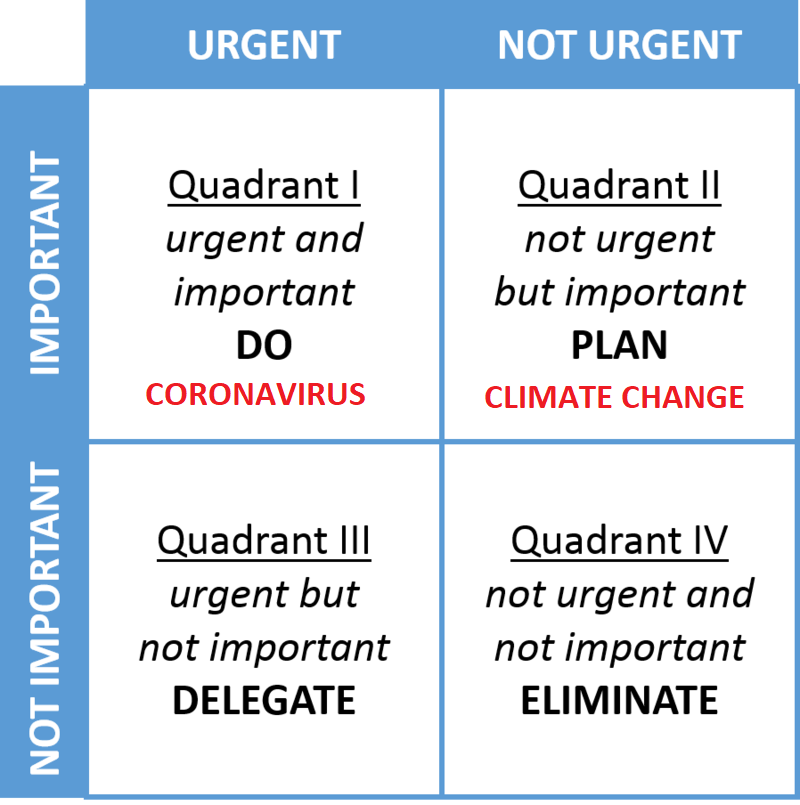The two have some informative parallels, although some observers draw the wrong conclusions
Originally published at Legal Planet

The coronavirus dominates the news and much of our minds. Here at Legal Planet, we have written about the coronavirus and presidential powers, disaster declarations, fossil fuel production, decision-making under uncertainty, inequality, and cities. I will join the party and consider what are the parallels and differences between the coronavirus crisis and anthropogenic climate change, and what lessons that we may be able to draw.
These questions are motivated by some obvious similarities: in each case, experts predicted the problem but decision-makers — and individuals — have taken insufficient action. The most useful comparison is with, on the one hand, early warnings of pandemics in general [1, 2, 3] and the coronavirus specifically [1, 2, 3] with, on the other hand, exhortations regarding future dangerous climate change. For example, as early as January 30, the World Health Organization’s coronavirus Emergency Committee concluded that

it is still possible to interrupt virus spread, provided that countries put in place strong measures to detect disease early, isolate and treat cases, trace contacts, and promote social distancing measures commensurate with the risk.
Yet decision-makers outside of east Asia did little until March, just as they continue to inadequately reduce greenhouse gas emissions, despite repeated calls by experts to do so.
The two phenomena share some important characteristics that help explain their neglect. First, prevention — such as strict “social distancing” and cutting emissions — must be done well before the negative impacts manifest. However, democracies are poorly equipped to make costly investments with distant rewards, as politicians who do so are likely to be voted out of office. Second, there is substantial uncertainty, some of which is irresolvable. Epidemiologists have long known that another serious epidemic would occur, but not when; and climate scientists have long known that the climate will change, but not the precise impacts thereof. Furthermore, both dangerous phenomena are novel to us. Almost no one alive today recalls the 1918 Spanish Flu — the last pandemic of such a magnitude — and relatively rapid climate change will be wholly new. Because of this, most people struggle to wrap their minds around the possible severity of each. But we still must make decisions, even under uncertainty. In such conditions, trusting scientists and their models (while scrutinizing their assumptions) is essential. Finally, preventing both the coronavirus and climate change are collective action problems, in which each country, city, business, or person must choose whether to take actions that provide widespread net benefits but impose localized net costs. Proper social distancing, thorough hand washing, and other personal preventative steps are analogous to reducing individual emissions. And we all would have been better off if China and other early-infected countries would have taken stricter measures, including limiting outgoing international travel, and if all countries (especially those with high per capita emissions) would implement a meaningful price on carbon.
So perhaps the leading lesson is that, after the coronavirus has passed, advocates for climate action can use it as an example of the wisdom of investing in costly preventative action, even in the face of uncertainty. After all, it is now clear that measures taken concurrent with harmful impacts are much less effective. Although this argument might help increase cooperation to overcome the collective action problem, I am not hopeful in this regard. We should thus not only call for widespread preventative measures, including reducing gross emissions and developing carbon dioxide removal technologies, but also assume and prepare for dangerous climate change through adaptation and developing solar geoengineering, which do not present such global collective action problems.
Useful conclusions can also be drawn from considering how the corona virus and climate change differ, despite some claims otherwise. Some environmentalists have pointed to the response to the coronavirus as evidence of what can be done in an emergency if people would just listen to the experts, grant power to the state, and make personal sacrifices. For example, May Boeve, executive director of 350.org, said:
We’ve seen that governments can act, and people can change their behavior, in a very short amount of time… And that’s exactly what the climate movement has been asking governments and people to do for years in the face of a different kind of threat—the climate crisis—and we don’t see commensurate action. On the one hand, it shows that it’s possible to do this, and it’s possible for this kind of mobilization of resources to take place in a short amount of time… We would see these kinds of emergency packages that would get people off of the fossil fuel grid and onto a clean grid right away… what’s so interesting about what’s unfolding with a public health emergency is that I think there’s a trust in the public health community to say, these are the measures we need you to put in place right now. They’re ready to go and policymakers are acting. And the same thing is true with climate change.
This is misguided. Coronavirus is an emergency whereas climate change is not. This is not to belittle the latter’s its importance but instead to emphasize its urgency. An emergency calls for immediate action, even if poorly thought-out, due to the sudden expected consequences of inaction. In the case of the coronavirus, we must take steps now to slow the disease’s spread and to prop up the economy, despite our imperfect information base and political processes. To some degree, this requires trusting experts, ceding power to government, and making sacrifices — which most people are currently doing given the circumstances. In contrast, climate change operates on a different time scale. Reducing it requires actions that are both well informed and soon, but the consequences are as urgent. If we treat climate change like an emergency, we are likely to enact policies that we would later regret. Some of you may hear in this an echo of the Eisenhower matrix, popularized by Stephen Covey:

To be clear, “plan” does not imply not acting, only that we have the luxury of taking the time to do it right.
Finally, some environmentalists are making more extreme — and wrong — links among the coronavirus, our environmental impacts, and economic activity. The Guardian‘s John Vidal asks, “is our destruction of nature responsible for Covid-19? As habitat and biodiversity loss increase globally, the coronavirus outbreak may be just the beginning of mass pandemics.” Another headline in The Guardian marvels: “Coronavirus pandemic leading to huge drop in air pollution: ‘Largest scale experiment ever’ shows what is possible as satellite images reveal marked fall in global nitrogen dioxide levels.” And at De Groene Amsterdammer (“The Green Amsterdammer”), academics Bram Ieven and Jan Overwijk write that the pandemic
is also a unique moment to commemorate our political situation. After all, the measures that are now being taken are in many ways identical to the measures that climate activists have been asking for for decades: less movement, less work and less exploitation. In short: reversing unending economic growth in order to halt the disruption of the climate…
If the situation is perceived as urgent, the social measures that have long been demanded from progressive movements suddenly become feasible…
We must politicize these events…
The Covid-19 pandemic makes it possible.
Nature is not punishing us for our sins, and the current economic contraction is no model that we should aim to replicate. Economic activity generates wealth, makes poor people not poor, and reduces human suffering. It is the veritable baby that should not be thrown out with the unsustainable bathwater. Furthermore, using a crisis to seize political power and advance an agenda of greater state control of people’s lives does not have a deplorable historical track record. Those of use concerned about the environment must resist the twin temptations of misanthropy and green authoritarianism.
